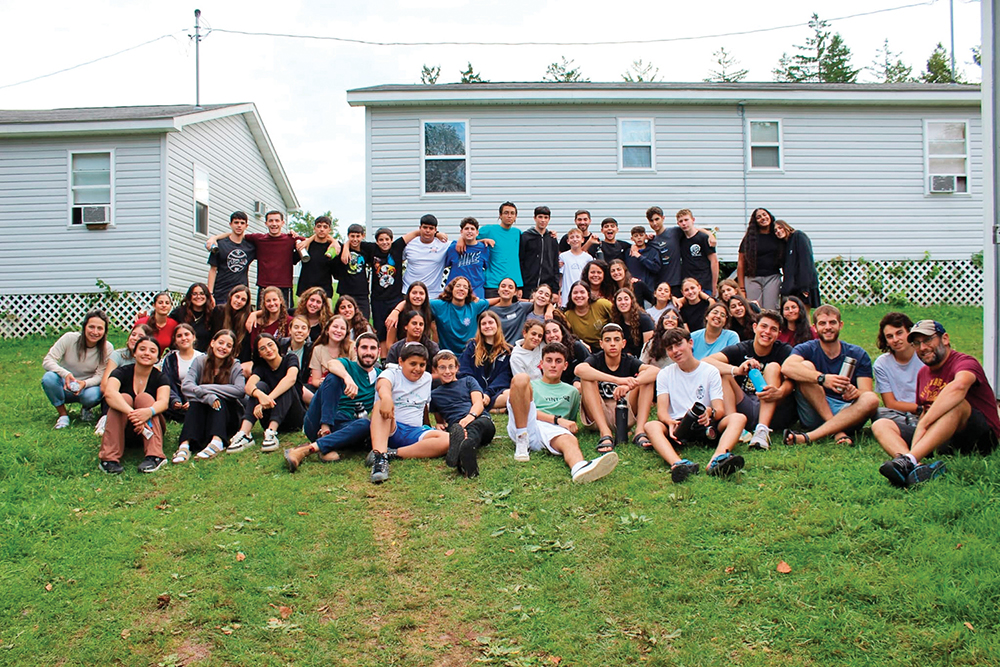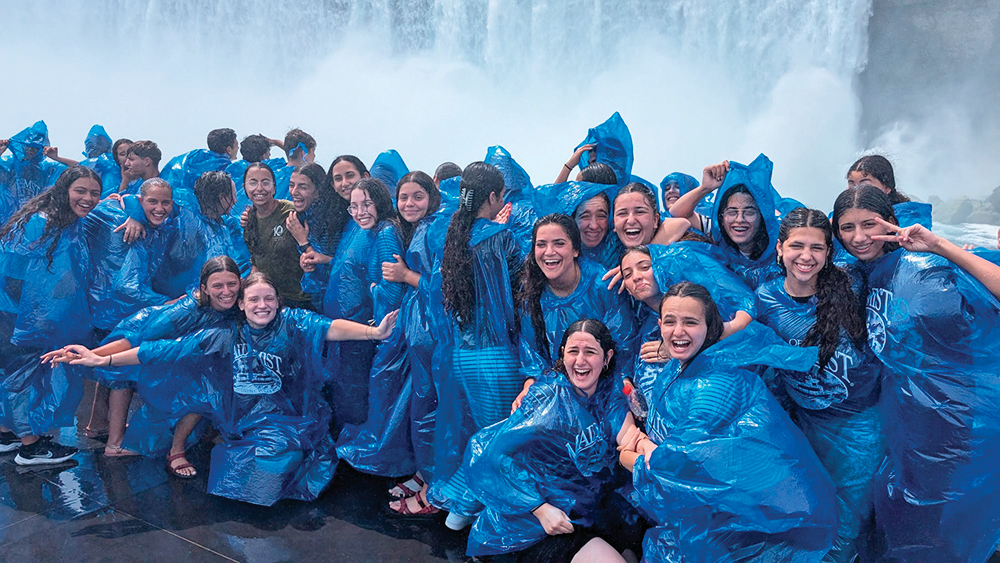
On Monday, August 19, Camp Moshava IO summer 2024 ended. In addition to its usual Israel-focused educational curriculum, Israeli campers and Mishlachat staff, Moshava IO offered Tochnit Tekuma, bringing displaced Israeli children to experience
Camp Moshava.
Rosh Moshava Channah Spiegelman described, “Camp Moshava is where our heart is. However, our heart is also with the State of Israel, and the people of Israel. Once the war broke out, we realized and understood that there was a need for children to have a beautiful summer and an opportunity to give them time and a place where they could just be kids. We brought them to Moshava so they could have respite, healing, and spend time with friends. Working with kids all year long, we have no idea how this war has affected or will affect, in the future, any of us, let alone soldiers.”
There were 150 recently-completed eighth and ninth graders over two “Tochnit Tekuma” two-week sessions. Israeli staff joined Hebrew-speaking social workers and psychologists who understood where these Israelis were coming from. The group had their own track in camp but overlapped activities with current campers on Shabbat. Tekuma campers experienced all the regular camp peulot and overnight trips. For many of these campers, it was their first time outside of Israel.
“The minute the first group of 75 kids got off the bus, for us, was like a dream come true,” expressed Spiegelman. “Since they left, my phone has not stopped ringing from parents. Kids wrote letters thanking us for the opportunity to rest their heads in a safe place, not having to worry about sirens, not having to be displaced and moved around, not hearing the news every hour, just the ability to laugh, sing, dance and have fun.”

Spiegelman noted the reactions of the Moshava children interacting with the Israeli campers. “It touched everybody. When they listen to the news and hear people were evacuated, they don’t understand what it means to be evacuated, or what they went through on October 7. Here, kids were able to look and say to them: ‘You’re courageous; we admire you; you’re strong.’”
Spiegelman noted the reactions of the American campers, “It was an incredible experience for them to just be around the Israeli campers.”
Camp Director Alan Silverman echoed, “After the war started, we discussed what we could do to help the displaced children, and came up with the idea of bringing them to Camp Moshava. The Tochnit Tekuma experience made an impact not just on the lives of the visiting Israeli campers but also on the American campers and staff.”
Westchester Day School eighth grader Andrew Lauchheimer learned about this program and decided to donate gifts from his bar mitzvah to Moshava’s evacuees program. Lauchheimer was invited to meet and greet participants. In his remarks, he told them how happy he was that they were there; “nobody deserves it more than you to be able to come to camp and have fun.”
Spiegelman described the campers cheering his name, dancing around him and picking him up. “It was amazing for them and for him.”
Lauchheimer expressed, “I chose to make this donation and bring these kids to Moshava because I think they deserved to be there, given how difficult this year was. They couldn’t do things kids normally do. After meeting and interacting with these kids, I feel like my donation lets them be free and have a break from a tense situation. I will always remember this summer by thinking how happy all these kids were at Moshava.”
This summer, Camp Moshava also dedicated 12 oak trees to fallen soldiers with direct connections to Moshava. At the ceremony, they put up temporary plaques. Silverman said, “The camp is working with the families to erect permanent plaques to include their names and a pasuk about them.”
Spiegelman also noted a Tochnit camper named Avishai whose brother Amitai was killed in Gaza in February. Avishai hadn’t spoken or cried about his brother since he was killed. One of the oak trees was dedicated to Amitai. Spiegelman asked Avishai to stand with her at the ceremony. “He stood next to me. I talked about his brother and he kept correcting me. I said, why don’t you say something? He hesitated for about a minute, then got up and told everybody this beautiful story. His brother was in and out of Aza, and brought with him pocket Mishnayot so he and his friends could learn. Avishai was so incredibly proud of this, telling this story about his brother.” Spiegelman noted, from Avishai’s camp experience, “He is feeling so strong and finally able to talk about his brother with the boys and counselors in his bunk. Those are all things that couldn’t have happened anywhere else.”

Spiegelman reflected how the campers weren’t sad to go home. “They were stronger going home.” She cited a girl who said, “I’ve been displaced twice. We lived in a hotel and then moved to Jerusalem. We haven’t gone back to the kibbutz. I’m going back now. These two weeks gave me the ability to rest my head. I’m going home with more strength.”
The camper added, “When you live in Israel, you don’t get to see what Zionism really is; you just do it. After two weeks in camp, we learned so much about the war and what’s going on. When you’re in it, you’re just in it. You don’t have time to reflect upon it. Here, you feel like heroes.”
Tochnit Tekuma was a project Moshava committed to and took upon themselves to make happen. Silverman acknowledged the commitment of the Moshava staff, in particular the large Israeli Mishlachat contingent who were also feeling the pressure from a security and political point of view and were able to make great contributions to camp this summer. Silverman also recognized Moshava alumni and supporters, who, when they heard about this project, made generous donations to make it happen.









